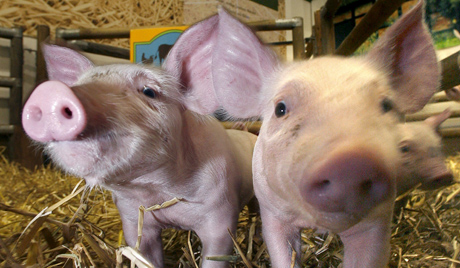The Voice of Russia Radio
Oct 5, 2012
Famous activist fighting for animal rights Walter Bond rejected the regular life and dared to challenge the modern society. Fighting desperately for animal liberation he lost his own freedom. In an interview to the Voice of Russia he opened up about his life and struggle.
” I think that modern civilization, particularly from the industrial age forward marks the beginning of humanities change from a cell, into a cancer within the global community of species.It will take an actual ecological disaster on a worldwide scale to wake humanity as a whole to the plight of environmental destruction, not just the threat of one” Walter Bond says.
Arctic ice, which has shrunken as much as ever, volcanoes and floods are too far away from us to realize the scale of the environmental tragedy we have. But it is easier to understand, when it comes to meat prices in the supermarket next door. To get 1 kg of meat, which will feed two adults, it is needed about 10 kg of cereals and other crops and 10.000 litre’s of water. You don’t need to be an expert to figure out how long could those two live by having that amount of crops and water for themselves. This is just numbers. We don’t even raise a point of useless suffering of animals at poultry farms, fur farms and others, about their oppression and inhumanity of people, working for animal husbandry, labs and circuses.
Following Bond, if you have this information but stay passive, you’re an accomplice. And in each of his letters he undersigns: “Animal Liberation, Whatever It May Take!”
His struggle is based on the pure and boundless love of animals. Unfortunately, at the moment it has been interrupted by his arrest. He was sentenced for arsons of the Sheepskin Factory, the Tandy Leather Factory and Tiburon Restaurant, where foie gras was served. But the activist regrets just the fact he was caught. “I knew that I was going to walk this path of militancy until I was killed or arrested,” – he says. Now he’s in the USP Marion, which also houses Victor Bout.
Both Walter‘s parents believed that living simply was noble and honest and that is how he also feels. He “was never ashamed to have less material garbage than other kids”. When he was 10 years old he communicated a lot to his older cousins, who were into all kinds of punk rock and underground music. Music had a great impact on Bond’s world outlook.
When he was 19, he worked by building slaughterhouses. There his conversion began. ” I tolerated the death of Animals all day around me as a fact of my job,” –he says. He worked there for half a year. First it was unbearable, but with time he got used to working 12 hours running clotted with blood. But once he witnessed a horrible scene, as his co-workers ran after the hog, which got free, and brutally killed him while the others enjoyed the “show” Bond quit and began working towards animal rights.
His reference book was ‘Animal Liberation’ by Peter Singer. Meanwhile he contacted several activist organizations fighting for animal rights in Great Britain and the US, in order to help them to spread the information about animal abuse and oppression in animal husbandry. Soon the young activist realized that “logic and ethics only go so far, and that unfortunately, a vast amount of people while paying lip service to ‘ the right thing’ are never going to be swayed in their behavior towards Animals because of interesting conversations”. It was time to act.
He also became part of the Straight Edge movement; a subculture which emerged in the hardcore punk scene. In part as a reaction against sexual revolution and hedonism the followers refused alcohol, tobacco, and other recreational drugs. They are often activists as well. With time Walter gave up more and more things, until his lifestyle became ascetic. Having no family or romantic relations, he left even his house – “a small studio apartment with about 3 pieces of used furniture”. “As I got older I learned that the things you own end up owning you, –Bond says. –I like freedom more than I like stuff”.
Although he was converted to Sufism, religion doesn’t take a big place in his life. Abdul Haqq, as he called after his conversion, says he’s a spiritualist, not a religionist. He makes certain ritualistic observances, but not because it’s his obligation, but because of “discipline and consistency strengthen the soul”. “If your faith is out of love, – he says, – your fight will be righteous. If your faith is from fear, it will become hateful and judgmental”.


